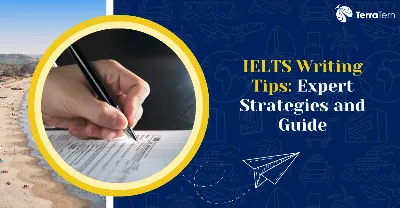Key Highlights
- Understanding the IELTS Writing Test Structure in 2025
- IELTS Writing Task 2 Overview: Updated 2025
- Top IELTS Writing Tips and Tricks for 2025: Updated Guide
- IELTS Writing Task 2 Tips for a Band 8+ in 2025: Updated
- General IELTS Writing Task 1 Tips: 2025 Guide
- Common Mistakes to Avoid in IELTS Writing: Updated 2025
- Sample IELTS Writing Questions and Model Answers for 2025
- Conclusion
One of the most important IELTS writing tips you can get is that success in the IELTS Writing exam relies on both frequency and tact. First, make a response plan: plan your ideas clearly before writing. Be clear, use coherence and do not forget to proofread. Don always fails to give answers to all parts of the task to get marks. Apply appropriate vocabulary according to the context and arrange your sentences differently to demonstrate the grammatical variety. Use an appropriate tone: academic tasks should be formal, and letters should not be informal. Keep the limits of the words to be short and to the point. Specifically, train frequently with actual testing procedures to increase speed and accuracy. Including and following these new IELTS writing tips will enable you to achieve a better band score in 2025.
Understanding the IELTS Writing Test Structure in 2025
Understanding the IELTS writing test structure is one of the most important IELTS writing tips you can ever get:
-
There are two sorts of IELTS writing: 1 and 2. The duration of the test is 60 minutes.
-
Task 1 = 150 words as a minimum. Task 2: minimum 250 words.
-
In Task 1, academic and general training have differences.
-
The two tasks are graded based on four criteria: Task Achievement, Coherence and Cohesion, Lexical Resource, Grammatical Range and Accuracy.
-
The four areas combine to average out band scores.
IELTS Writing Task 1 Overview (Academic & General)
Here are some IELTS writing tips as part of a task 1 overview:
-
Academic Task 1 requires you to write about visual data in charts, graphs, tables, diagrams or processes.
-
In General Training Task 1, you are asked to compose a letter given a situation.
-
Formal, semi-formal and informal letters are the kinds of letters.
-
You should take approximately 20 minutes to complete this task.
-
The minimum word count is 150 words.
General IELTS Writing Task 1 Tips
-
One should always write a letter by determining the type of letter to be formal, semi-formal, or informal.
-
Tune your letter to the purpose and your audience.
-
Write in your own words and cover every bullet point mentioned in the question in 3-4 paragraphs.
-
Do not use so-called contractions such as can or can not, in formal letters.
-
In casual letters, use colloquial words and phrases.
-
The structure is as follows: Greeting, Purpose, Body, Closing.
-
Check the official IELTS task 1 rubrics on scoring.
Also Read: Master IELTS Writing Vocabulary: Band 7+ Tips & Strategies
IELTS Writing Task 2 Overview: Updated 2025

Here are some IELTS writing tips as part of a task 2 overview:
-
Task 2: This part implies writing an essay and responding to a concrete question or problem.
-
Some common question types are: Opinion, Discussion, Problem-Solution, and Advantages-Disadvantages.
-
The essay should be written in at least 250 words.
-
This will best be done in 40 minutes.
-
This weighted task comprises 66 per cent of your writing band (score).
IELTS Writing Task 2 Tips
-
Answer planning should be done by first identifying the very nature of a question.
-
Ensure that you address each component of the question straightforwardly.
-
Present your thoughts by using particular examples and rational arguments.
-
Never make a non-topic and irrelevant filler.
-
Be consistent throughout the essay.
-
Connect ideas and make appropriate links with the help of transitions and cohesive devices.
-
Use the structure of 4 or 5 paragraphs: Introduction, Body Paragraph, Conclusion.
Top IELTS Writing Tips and Tricks for 2025: Updated Guide
Here are the top IELTS writing tips and tricks for 2025:
Planning and Structuring Your Answer
Planning and structuring your answer is one of the most important IELTS writing tips and tricks:
-
Plan before writing for 5 minutes.
-
Simply come up with an outline of 2-3 main things.
-
Make sure that each paragraph of the body has a single idea.
-
Introduce the paper clearly and conclude with a conclusion.
-
Direct each paragraph using topic sentences.
-
It should have a logical flow from intro to conclusion.
-
Design = Introduction - Body 1 - Body 2 - Optional Body 3 - Conclusion.
-
Bulleting helps in a quick organisation during planning.
-
Use linking words like "Firstly", "Moreover", "However", "In conclusion".
Vocabulary and Grammar Mastery
Here are some vocabulary and grammar mastery-related IELTS writing tips:
-
This should be done using synonyms to prevent redundancy.
-
Learn topic-specific vocabulary (education, environment, health, etc.).
-
Make use of easy and complicated sentence structures.
-
Vary by using modal verbs, passive voice, and conditionals.
-
The informal or slang terms should be avoided.
-
Practice IELTS words with high frequencies once a week.
-
Rewrite your own words in 50 paragraphs.
-
Accuracy can be checked with the help of such tools as Grammarly or Cambridge English Practice.
-
As a study example, read Band 8-9 model essays and their style and tone.
Linking Words and Cohesion
Here are some IELTS writing tips for the linking words and cohesion section:
-
Make use of connectors to accomplish logical flow.
-
Examples: "Firstly", "Secondly", "On the other hand", "As a result", "Therefore".
-
Avoid overusing "also", "and", " but "but".
-
Make a transition at the beginning of a paragraph.
-
Keep up consistent tense and subject concentration.
-
Steer clear of jerky sentences and overuse of commas.
-
Write out link summaries.
-
Restate your old ideas in your own words, using other words.
Time Management Strategies
Here are some IELTS writing tips related to time management strategies:
-
Forty minutes Task 1, 20 minutes Task 2Allow minuteses for every task for planning.
-
Spare 30 minutes to compose Task 2 body.
-
Take 5 minutes at the end of the proofreading.
-
It is advisable not to rewrite complete sentences in the review.
-
Point out errors such as repetition, grammatical slips, or lack of logic.
-
Employ the use of a screen timer during practice.
-
Write 5-6 complete full-length writing tests before the exam.
Also Read: IELTS Exam Syllabus: Latest Exam Guide & Updates
IELTS Writing Task 2 Tips for a Band 8+ in 2025: Updated

Here are some IELTS writing task 2 tips to help you secure a band 8+:
Understanding and Analysing the Question
Understanding and analysing the question is a good step from IELTS writing task 2 tips towards an 8+ band score:
-
Find Keywords and instruction words.
-
Determine essay type (opinion, discussion, etc.).
-
Divide the question into 2-3 questions.
-
Mark practice task clues.
-
Get practice questions using sample questions.
-
In the essay, make sure the whole question is answered.
Developing and Supporting Ideas
In task 2, follow these IELTS writing tips for developing and supporting ideas:
-
Select the ideas that you can define well.
-
Illustrate supporting arguments by use of examples or hypothetical situations.
-
Follow the PEEL scheme: Point, Locate, Explain, Find an Example Link.
-
Write down 3 5 ideas after brainstorming.
-
Do not use examples that are rehearsed or overdone.
-
Concentrate on quality and not the quantity of ideas.
Writing Effective Introductions and Conclusions
Follow these IELTS writing tips for writing effective introductions and conclusions:
-
In the introduction, find your words around that question.
-
Put up your thesis/position.
-
Do not mention everything in your introduction.
-
To begin, use phrases like In conclusion or To sum up.
-
Rebuttal: Do not repeat what you have said in your introduction.
-
Do not make any new points in the conclusion.
Also Read: IELTS Band Score Table: New Academic & Listening Guide
General IELTS Writing Task 1 Tips: 2025 Guide

This section covers all the general IELTS writing task 1 tips:
Addressing All Bullet Points
Addressing the bullet points is extremely crucial:
-
There should be no omissions of points highlighted in the prompt.
-
Each point should be given a chance in the number of paragraphs, i.e., try to provide each point in one section.
-
The absence of one of the bullets can reduce your Task Achievement grade.
-
Take some time and jot down the list of bullet points so that you can keep track.
Tone and Formality
Maintaining your tone and formality
-
Never the same tone for every situation and whoever you are speaking to.
-
Complaint letters should be written in a formal style, as well as a job application letter or any official request.
-
When addressing colleagues, landlords, or acquaintances, write semi-formally.
-
Personal letters to friends or family should be written in an informal tone.
-
Contractions should not be used in formal writing, and language should be professional.
-
In informal writing, contractions and tonal calmness are acceptable.
-
Use an opening and closing phrase that matches the tone.
-
Sample: Use Dear Sir /Madam at the beginning of a formal letter, and conclude it by writing your name followed by the words Yours faithfully.
-
Example: The informal letter can begin with: Dear John, and sign off with: see you soon.
Common Mistakes to Avoid in IELTS Writing: Updated 2025
This section covers some IELTS writing tips to follow to avoid common mistakes:
-
Write answers which are not irrelevant to the question.
-
Observe all the instructions given in the tasks.
-
Do not use fewer words than the minimum expected points to miss marks.
-
Be careful not to revert to rote.
-
Linking words must be used correctly and not artificially.
-
Use the same tense when writing.
-
It is not advisable to use the same vocabulary.
-
Categorise your paragraphs so they have a topic much anticipated by the supporting details.
-
Never forget to have some time to proofread your work so that you can correct errors of grammar and spelling.
-
Do not use informal or familiar language when completing a task that requires formal language.
Also Read: Is IELTS Difficult? New Insights, Tips & Strategies
Sample IELTS Writing Questions and Model Answers for 2025

Here are some sample IELTS writing questions and model answers:
-
Academic Task 1: Give an Account of a Line Graph of the pollution level between 2000 and 2020.
-
General Task 1: Write to Parker and inform the boss of a rent problem.
-
Task 2 Opinion: Do you agree that remote working enhances productivity?
-
Task 2 Discussion: Discuss the merits and demerits of studying abroad.
-
Model Band 9 Answers: Available at IELTS Liz, IELTS IDP, and British Council.
Conclusion
The success of writing in IELTS depends not only on routine writing but also on following these IELTS writing tips. To achieve a high score, it's essential to begin with planning—organise your ideas before you start writing. In your answer, be able to make it clear and make sense, and never forget to proofread after finishing it. You must ensure you answer every part of the task prompt, since you may score relatively low. Employ words appropriate to the situation and even strive to expand your sentence patterns to show your versatility in language. Use the proper tone (formal regarding academic assignments and appropriately informal when writing personal letters). Follow the word limits suggested to avoid being fined on the grounds of short literary work, or get distracted by exceeding the word limit. And last but not least is the situation that, during practice sessions, makes it impossible to repeat the real test conditions to gain speed and accuracy. With that kind of insight on the update in the IELTS writing mechanism, you can aspire to score a full band confidently in 2025. Contact TerraTern for more information!






